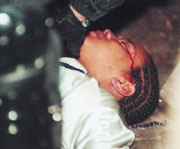Put Kris Kime down as the first death directly attributable to the Paul Schell Re-Election Campaign.
Granted, there are a few intermediary steps involved. Public officials, through action or inaction, contribute to the deaths of citizens all the time, but rarely is the chain of causation so clear and so avoidable. After the vicious young thugs who terrorized Fat Tuesday themselves, the person who came out of this atrocity with the most blood on his hands is the mayor. And the most regrettable aspect of the next day’s earthquake is that it came only hours before the start of an uproar that would have guaranteed the removal of this breathtakingly incompetent and venal man from elected office once and for all.
Let’s review: 1.) Young thugs roam the streets, preying on the weak and drunk. They attack a young woman. Why? Because they could. 2.) Kris Kime comes to her aid. Why? Because unlike most of the Mardi Gras revelers, he was honorable enough not to stand by and watch someone getting the life thrashed out of her. 3.) The thugs turn on Kime. Why? See 1. 4.) Riot cops are present in great numbers and, unlike Kime, are fully equipped with riot gear and a full arsenal of weaponry—not to mention professional training in intervention and a professional obligation to act. They stand nearby and watch. Why? They are under standing orders to stay out. 5.) Why? Because the police department and the mayor were strongly (and rightly) criticized for acting too soon when there were few problems the preceding weekend.
This wouldn’t matter—to the point where they obey the order even as a citizen is obviously and publicly being murdered—unless it had come from very high up—like from a man who was trying hard to please the public and remain in office and who could sleep comfortably while hell was paid.
Schell shrugs it off as a police matter—the “not my department” routine. In Seattle-Tacoma-Everett, 3.2 million people know this is bullshit, just as it was when, during WTO, Paul used the same line to disavow police abuses so flagrant and well-documented as to horrify the world. After the events of the weekend, if Schell didn’t at least review the plan, that’s incompetent too. If he didn’t, Kerlikowske did, with an eye toward pleasing Schell. But watching silently while the public commits violent crimes is not in Kerlikowske’s mold—he’s a cop. Schell is not. Standing down no matter what is a civilian’s order, and the new police chief was following orders. This has Schell’s bloody fingerprints all over it.
After what happened to Norm Stamper, Kerlikowske must be wondering how he, too, got sucked into taking one for the mayor—right down to explaining that the situation was “too dangerous.” That’s what we pay police for, and they take pride in it. If it’s too dangerous an action for riot cops to save an obviously threatened life, it’s too dangerous for anyone to be there, and the crowd must be dispersed.
Kerlikowske’s excuse is flatly preposterous. And people who witnessed Fat Tuesday’s fiasco don’t buy it. Rank-and-file cops are in an uproar. Pioneer Square workers uniformly want Schell’s head. I interviewed a number of the latter last week. Here’s one: “I think that we probably have the worst mayor and the worst police chief of anyone in the world,” said Jesse Scott. “They’re so freaked out after their horrible response to WTO that they don’t know what to do. I think Paul Schell should resign. He thinks he’s the mayor of Carnation.”
Apologists cite the difficulty of pleasing everyone. You go in too early, people criticize you; you go in too late, people criticize you.
Here’s an easy guide: If nothing’s happening, don’t assault crowds with riot cops, tear gas, pepper spray, and sting bombs. If someone’s dying, act. It’s really not rocket science.
No politician produced the people who committed these crimes. But politicians’ decisions can give violent kids the opportunity to act out on a mass scale.
How many times does Paul Schell have to prove it? This isn’t a question of ideology or my disliking developer kissy-kissy. It’s about saving lives. It’s a matter of judgment that’s far, far worse than poor; wittingly or not, Schell is an extremely dangerous man in a crisis. I’d vote for City Attorney and mayoral hopeful Mark Sidran before voting for Schell; I’d work for Sidran if it came to that.
We were lucky Paul Schell didn’t kill anybody during WTO. This time, our luck ran out.
Reporting live
Mardi Gras was, in my estimation, a much bigger story than the earthquake, in terms of what we need to do in the future to address it. It’s worth another full column (if not books) to consider what produced Tuesday’s scene—the gangs who attacked and the people who watched. But our local media needs to particularly question a small subset of the folks who watched: themselves.
There were at least four full television crews—and who knows how many others—reporting up close from scenes where people were being brutally attacked. I’m sure that if any of them actually tried to intervene in the crimes being perpetrated, we would have heard about it. So why did they just stand there and report? Don’t reporters and camerafolk have the same obligation as any other citizen to intervene in an atrocity? At least other onlookers had the slim excuse of being drunk. These people didn’t, and “doing your job” is no excuse for failing to try to save a life.







